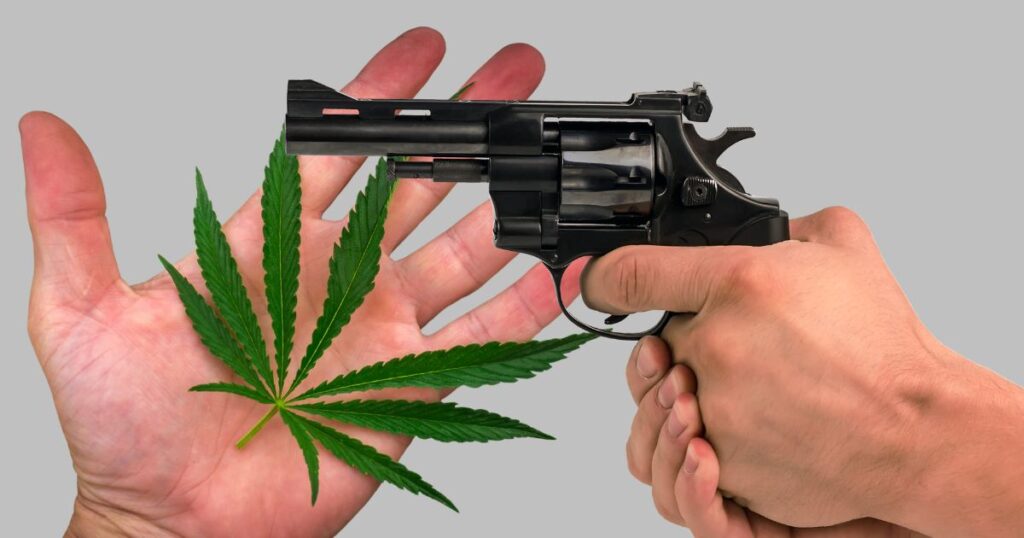Should habitual marijuana use disqualify someone from exercising their constitutional right to bear arms? According to a recent federal court ruling in Texas, the answer is “not necessarily.” This decision adds a significant chapter to the ongoing legal battles surrounding cannabis policy, marijuana users with firearms, and Second Amendment rights.
U.S. District Judge David Briones, presiding over the Western District of Texas, ruled that the federal prohibition on firearm ownership for marijuana users is unconstitutional as applied to a defendant who admitted habitual cannabis use. The judge determined that the government failed to provide sufficient historical justification for disarming individuals who were not under the influence of marijuana at the time of arrest.
This ruling could have significant implications, not only for cannabis users but also for the evolving interpretation of the Second Amendment in a nation where nearly half of all states now have adult-use cannabis programs.
A Texas federal judge ruled today that the federal ban on gun+drug possession is unconstitutional as applied to a defendant who was not shown to be "intoxicated by marijuana at the time of [the] incident, or at the time he was arrested." https://t.co/vpIKrTwlQO pic.twitter.com/7Unsf7Ccfx
— Firearms Policy Coalition (@gunpolicy) December 30, 2024
Striking Down Outdated Precedents
The case centers on Adrian Gil, a resident of El Paso, Texas. Gil faced federal charges after a 2021 police response to his home resulted in the discovery of two large bags of marijuana alongside firearms. Gil admitted to being a daily cannabis user since age 14 and also acknowledged knowing that federal law prohibits marijuana users from possessing firearms.
Under 18 U.S.C. § 922(g)(3), it is illegal for individuals who use or are addicted to controlled substances, including marijuana, to own firearms. Gil initially pled guilty, which led to a conviction and a 35-month prison sentence. However, he later appealed the case based on evolving legal interpretations of gun rights.
Judge Briones ultimately granted Gil’s appeal, dismissed the indictment, and allowed Gil to withdraw his guilty plea, citing constitutional concerns.
“The Government failed to meet its burden,” Briones wrote, “to identify a historical analogue similar enough to 18 U.S.C. § 922(g)(3) to show that individuals like Defendant were disarmed at the time of the Founding.”
The Evolving Legal Landscape with Marijuana Users and Firearm Owners
At the heart of the ruling is a significant test established by the U.S. Supreme Court in New York State Rifle & Pistol Association v. Bruen. Under this framework, any firearm regulation must align with the Constitution’s text and historical traditions as understood during the nation’s founding. Courts must explore whether modern regulations have historical equivalents that would justify their application today.
Judge Briones leaned heavily on this standard in his ruling, as well as previous cases heard by the U.S. Court of Appeals for the Fifth Circuit, which have similarly scrutinized federal firearm laws as they apply to marijuana users. The Fifth Circuit previously ruled that restrictions based solely on past or habitual drug use carry a greater burden on Second Amendment rights than what history and tradition support.
Takeaways from the Ruling
Marijuana Use Alone Doesn’t Justify Disarmament
One of the case’s most striking themes is the distinction between past cannabis use and intoxication at the time of firearm possession. Briones emphasized that the government presented no evidence that Gil was under the influence of marijuana when police discovered his firearms, making it difficult to justify disarmament under New York v. Bruen’s historical standard.
The judgment argues that restrictions targeting a “presently intoxicated person” may have some constitutional basis, but generalized bans for habitual drug users go far beyond that threshold.
Expanding the Interpretation of “The People”
The government argued that habitual drug users are not part of “the people” granted rights under the Second Amendment, deeming them outside the scope of law-abiding citizens. Judge Briones rejected this claim, noting that the Bill of Rights’ references to “the people” consistently apply to all members of the political community.
“Defendant is part of ‘the people’ whose conduct is covered and protected by the Second Amendment,” Briones asserted.
This interpretation broadens the application of constitutional rights, emphasizing that people involved in certain illegal activities still retain their fundamental freedoms.
The Role of Historical Context in Modern Gun Laws
Judge Briones criticized the prosecution for failing to draw a meaningful historical analogy. He found no solid evidence to suggest that early American lawmakers disarmed individuals solely for engaging in habitual drug use, further undermining the case for maintaining the federal ban on firearms for marijuana users.
“This Court agrees that ‘based on habitual or occasional drug use, § 922(g)(3) imposes a far greater burden on [Defendant’s] Second Amendment rights than our history and tradition… can support,’” the judgment reads.
Changes in Second Amendment Law
This ruling is a pivotal moment for cannabis users navigating federal firearm laws. However, it’s important to note that Judge Briones’ ruling applies specifically to Gil’s case and does not set a binding precedent for other courts. Still, it adds to a growing body of legal opinions that challenge the federal gun ban for marijuana users under the Bruen standard.
Yet, this ruling also adds complexity. Marijuana remains federally illegal, as it’s still classified as a Schedule I substance under the Controlled Substances Act. This means federal laws still broadly view marijuana users as criminals, even in states where medical or recreational cannabis use is legal. For cannabis-friendly states, such contradictions between federal and state laws further muddy the waters.
Alcohol vs. Marijuana and Firearm Ownership
One of the more contentious—even hypocritical—points surrounding this issue is the government’s stance on substances. Alcohol, despite its well-documented links to violence and impaired decision-making, does not disqualify individuals from owning firearms. This raises an obvious question for cannabis advocates:
Why are marijuana users treated differently while alcohol users, who may pose far greater public safety risks, still retain their right to bear arms?
The argument for reevaluating this inconsistency will likely grow louder, particularly as public opinion shifts further in favor of marijuana legalization.
This case also reinforces the importance of challenging overly broad government regulations and underscores how evolving legal precedents can expand individual rights in surprising ways.
What’s Next for Federal Gun and Marijuana Laws?
The friction between evolving gun rights interpretations and outdated federal marijuana policies is unlikely to disappear anytime soon. Courts across the nation seem poised to further address these controversial issues, especially as cases like U.S. v. Adrian Gil inspire new challenges. Separate from firearm cases, the ongoing push for federal cannabis legalization could render many of these disputes irrelevant.
For now, those who regularly use cannabis and own firearms should remain informed and cautious about their legal standing, as rulings like Briones’ highlight the murky and evolving nature of current laws.
















